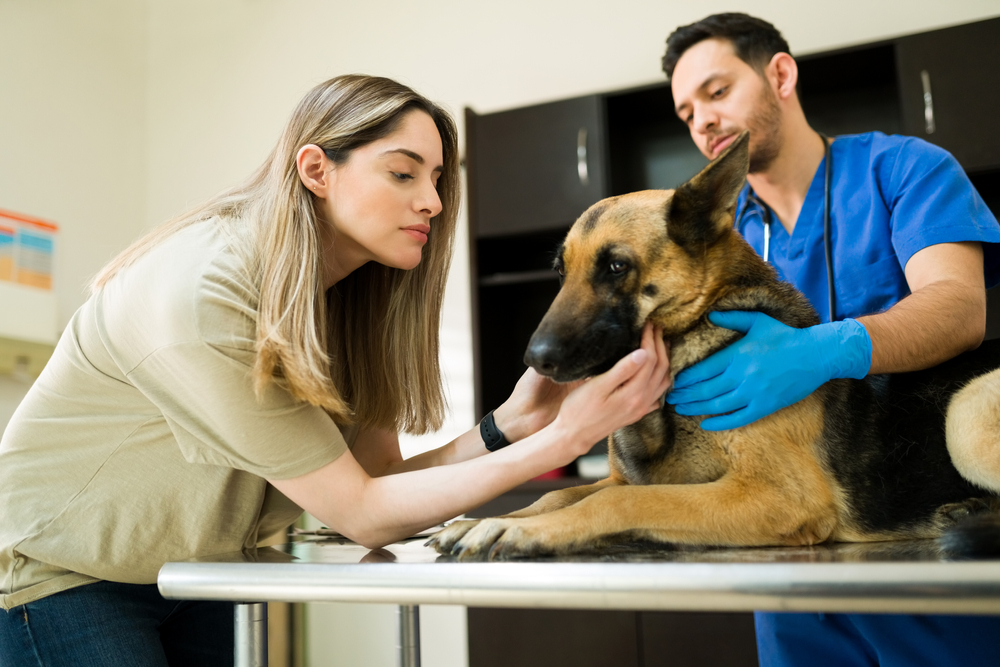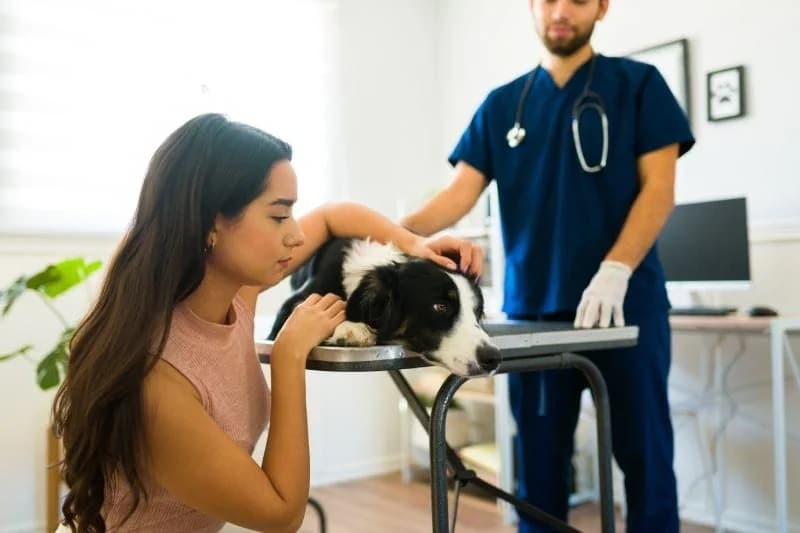Having a sick dog can understandably leave you feeling stressed, and trying to balance your job with tending to your poorly canine makes for a difficult situation, especially when it comes out of the blue. Therefore, even though it’s not nice to think about your dog becoming ill, it’s best to develop a plan beforehand to ensure your dog gets the proper care they need. This is especially important if you have an older dog, or a dog living with a chronic health issue.
Your plan will mostly depend on your dog’s condition and your workplace’s culture and flexibility. We’ve prepared some ideas and action steps you can take if your dog ends up getting sick.

The 8 Things to Do If Your Dog Is Sick & You Have a Job
Here are some things you can do to make sure your dog gets the right level of care while they’re sick. Just keep in mind that it’s best to consult a veterinarian to determine the amount of care your dog needs before contacting your employer.
1. Consult a Veterinarian
One of the first things you should do is have a discussion with a veterinarian about your dog’s care needs. A veterinarian will be able to assess your dog’s medical condition and determine how much care and attention they’ll need while they recover. There are some cases where it’s safe to leave your dog for a few hours while you work. So, it’s very possible that your dog will be fine as long as they’re kept in a safe space while you’re away.
In some cases, a veterinarian will recommend more intensive care and attention for your dog. If you happen to encounter these situations, make sure to ask the veterinarian about your dog’s specific care needs so that you can have a realistic picture of how much time away you’ll need from your job.
Did you know you can speak to a veterinarian without having to travel? Just head over to PangoVet. It's our online service where you can talk to a vet online and get the advice you need for your pet — all at an affordable price!

2. Explain the Situation to Your Employer
Once a veterinarian deems that your dog requires more care at home, it’s time to let your employer know about your situation. Some employers can be understanding, while others may not understand why a pet would need so much attention.
It’s best to be honest and let your employer know about the seriousness of the situation and how much your dog means to you. You can also come up with some alternative solutions to ease the burden. For example, it might be helpful to shift your hours so that you work earlier and leave earlier. You may be able to use some of your vacation time or sick leave, if your employer is agreeable.

3. Request to Work from Home
After the COVID-19 pandemic, more businesses are open to having employees work from home. It doesn’t hurt to ask your employer if there are some responsibilities or tasks that you could perform from home. It’s also helpful to stress that this is just a temporary arrangement that will end when your dog recovers.
4. Ask Family or Friends For Help
If your employer has rigid scheduling policies and you don’t have enough PTO days, try asking your family and friends to check up on your dog or stay with them while you’re away. If you have some friends available, do your best to make the visits as easy as possible for them. Leave clear instructions on how to get into your home and how to take care of your dog. Make sure to include a veterinarian’s phone number in case of emergencies. It’s also nice to stock your pantry with your friend’s or family member’s favorite snacks to show your appreciation.

5. Use a Pet Sitting Service
If you don’t have family or friends available during your work schedule, you can try using a pet-sitting service. This will ensure that your dog doesn’t have to leave the comfort and familiarity of their home. When looking for a pet sitter, make sure to visit only reputable businesses and websites that have vigorous onboarding processes for their pet sitters. Good pet-sitting businesses will also usually have pet sitters with experience in caring for dogs with health issues.
6. Ask a Veterinarian About Boarding Services
Some veterinary clinics have a boarding facility. Their boarding services may be restricted to pets that require extra monitoring before or after surgery. However, the veterinarian may have the capacity to board your dog if you don’t have any other options. So, it doesn’t hurt to ask if your dog can stay with them for a few days while they recover. It’ll also ensure that your dog is being watched and cared for by professionals who have experience working with sick animals. Be prepared to pay a hospitalization fee for each day they spend there, but if your dog needs to be checked frequently throughout the day, this may be one of the best solutions.

7. Be Proactive About Switching Shifts With Co-Workers
If your company allows you to switch shifts with other employees, be proactive about finding co-workers who can take your shifts. In most cases, your co-workers won’t come up to you first to change shifts with you. So, make sure to initiate and approach people who’d be able to cover your shift. It’s also helpful to explain your situation to them and offer to cover for one of their shifts that lands on a day when they’d prefer to be off.
8. Get a Pet Camera
There is a huge variety of nanny-cam type cameras available that you can place in your home to keep an eye on what your dog gets up to when you’re not around. If your dog can be left for longer periods of time, you can use these cameras to monitor them, and many even let you talk to your dog!
If you’re using this option, it would be a good idea to have someone “on call” who lives close to home in case there are any emergencies, unless you work a short distance away.


Final Thoughts
There are several things you can do when your dog is sick and requires extra attention. First, have an honest and respectful conversation with your employer about your situation and be proactive with making offers to help work run smoothly while you care for your dog. If your employer doesn’t offer enough time off or the option to work from home, try asking family or friends if they can stop by and check on your dog. You can also look into pet sitters who can stay with your dog while you work. If your dog requires extensive attention, it’s often best to talk with a veterinarian to see if boarding your dog at their facility is a viable option.
Having a sick dog can be very stressful. Therefore, it’s quite normal and reasonable to reach out to others and ask for help so that you can be there for your dog and ensure they receive the best possible care.
Featured Image Credit: antoniodiaz, Shutterstock





















